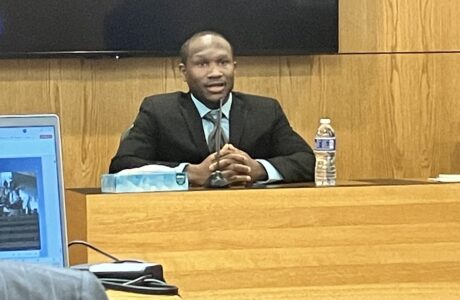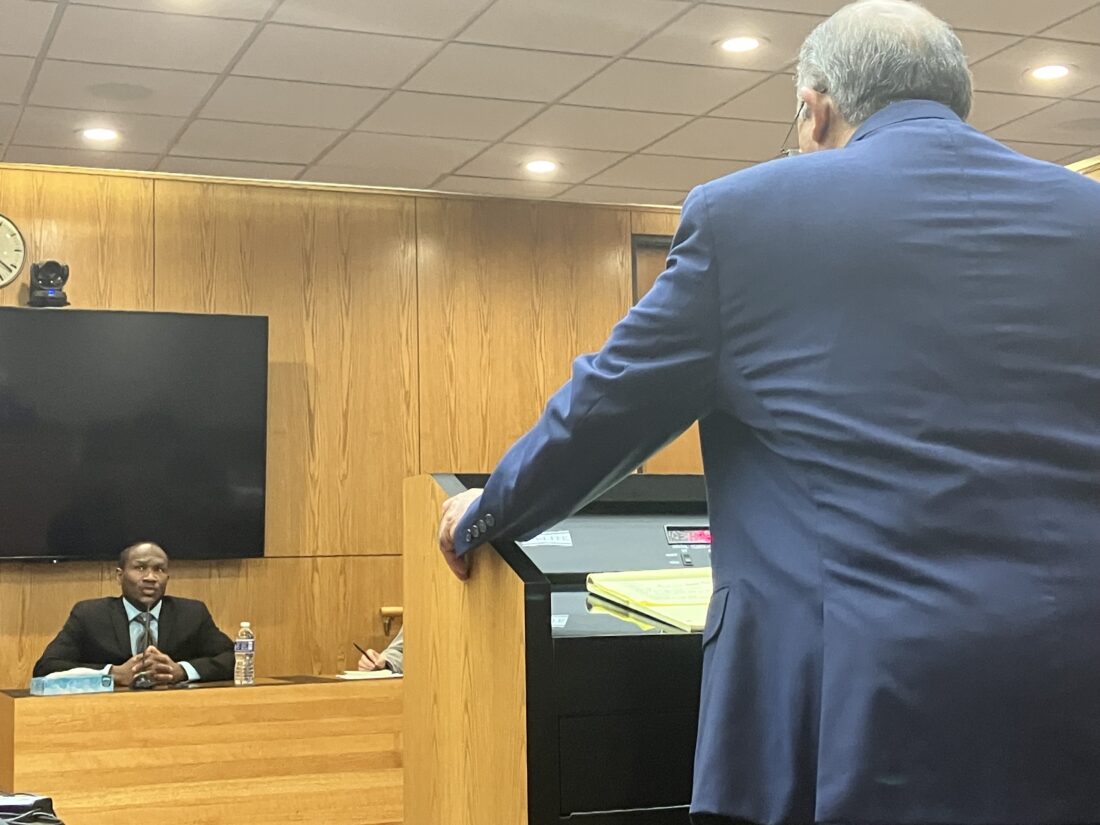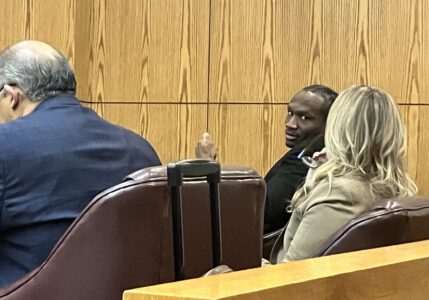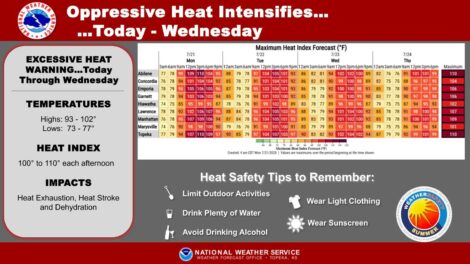Defendant claims he fatally shot man 3 times because he was ‘terrified,’ and didn’t report it because of ‘prejudice’

photo by: Kim Callahan/Journal-World
Nicholas Beaver testifies at his murder trial on Wednesday, July 23, 2025, in Douglas County District Court.
A defendant accused of gunning down a man in broad daylight in front of the Lawrence Public Library told a jury that he did so because he was “terrified” after he said the man threatened to cut him up “in little bitty pieces.”
Though he maintained he acted in self-defense when he fatally fired three bullets into 39-year-old Vincent Lee Walker on March 6, 2024, Nicholas Beaver, 34, fled from the scene on a bicycle as fast as he could, even fighting off a man at the Vermont Street bus stop who had grabbed him.
“There was no way I was going to stick around,” he told the jury as he took the stand in his own defense Wednesday in Douglas County District Court.

photo by: Contributed
Vincent Lee Walker
Asked by his attorney, Razmi Tahirkheli, why he didn’t call police if he believed the shooting was justified, Beaver — who, like Walker, is Black — said he was afraid of racism from police and didn’t trust them.
“Fear of injustice from them,” he said. “Prejudice. Black man who shot someone. I don’t think the situation would have went well.”
On cross-examination, Deputy District Attorney David Greenwald pressed Beaver on why he volunteered a lie to Detective David Garcia at the police station later that night. Beaver was arrested after leaving a trail of evidence, including his Mongoose bike, a handgun and an assortment of clothes in the neighborhood between the library and Ninth and Iowa streets.
Garcia had read Beaver his Miranda rights, and Beaver declined to talk. But then Beaver voluntarily re-engaged, asking what he was being charged with. Garcia said the shooting downtown, to which Beaver replied: “You got the wrong person, bro.”
This exchange was recorded on video and shown in the courtroom outside the jury’s presence during an evidentiary hearing; jurors heard about the exchange through testimony by Garcia.
Greenwald asked Beaver why he did not avail himself of the “opportunity” to tell the truth at the police station, and Beaver disagreed that it was an opportunity, saying that the police “never asked” him. Greenwald then reminded Beaver that the police could not legally ask him what had happened since Beaver had exercised his Miranda rights to remain silent.
Greenwald noted that no evidence at the trial, besides Beaver’s own testimony, indicated that Walker had threatened to harm Beaver or had shown a knife or a weapon of any kind.
Police testified earlier in the trial that they had found a utensil among Walker’s belongings that they described as a tool for spreading butter or frosting or perhaps paint. A photo shown to jurors depicted a metal tool with a rounded end and blunt edges. No witnesses who were at the scene testified that Walker pulled out that tool or any kind of weapon.
Even Beaver did not assert that he saw a knife — just “a couple of things in his hand,” one of which, Greenwald argued, pointing to video evidence, was simply Walker’s hat.
“He didn’t punch, hit or kick you?” Greenwald asked. Or push?
“He spit in my face,” Beaver said.
“He disrespected you?” Greenwald said. “He spit in your face.”
Greenwald asked if spit — which Beaver initially indicated was “inadvertent” spray as Walker was shouting — warranted deadly force, and Beaver seemed to agree that it did not.
Tahirkheli then asked Beaver if he shot Walker specifically over the spit, and Beaver said no; he shot him from fear of being cut.
“I was scared,” he said.
Greenwald asked if Beaver had said “Stop! Wait!” before pulling the trigger of his gun — which Beaver said he had “legally” borrowed from a friend for “protection” — and Beaver said he gave no such warning.
Greenwald also asked him about a jailhouse video call that jurors saw in which Beaver tells two women that “I killed the (N-word), but he asked to be killed.” Greenwald wondered why Beaver did not specifically express to the women that he feared that Walker would cut him. Beaver replied that he thought he had when he said to them that Walker was “stepping, and I was stepping harder.”
A witness earlier in the trial said that Beaver had approached him the night of the killing to ask for a cigarette lighter and had said, “A guy spit in my face and I shot him.” Greenwald asked Beaver why he didn’t mention to the man that he had acted in self-defense. Beaver said he was simply abbreviating the story and exercising his right not to talk.
The defense introduced evidence of Beaver’s psychiatric history, but Judge Stacey Donovan limited the scope of that since Tahirkheli had not given the state the notice that’s required if one is going to claim a defense of mental illness or defect.
Beaver testified that he had been homeless off and on, staying at the Lawrence shelter and waiting to get disability payments after a shooting in Topeka had injured his bladder and intestines. He said he suffered from bipolar depression and post-traumatic stress disorder and was not taking medication at the time of the shooting near the library.
He went to the bus stop in front of the library that evening to catch a bus back to the shelter along with a group of others. That’s when he said Walker, who was bigger and “hostile,” “brushed by me real aggressively” and their confrontation ensued.
After Beaver testified, Robert Barnett, a clinical psychologist who evaluated Beaver at Tahirkheli’s request, said Beaver had been a little “tricky” to diagnose because he exhibited some schizophrenic symptoms, “but I don’t think he’s schizophrenic.”
Barnett said that Beaver had had “several medical traumas,” including being shot by his own brother in 2022, and that someone with his mental health history could have hallucinations, delusions or a “gross loss of reality contact.”
Greenwald pointed to a section of Barnett’s report that indicated that Beaver admitted being irritable around people he deemed hostile.
Beaver told Barnett, “They say I shot someone,” according to the report, but Barnett testified that Beaver never mentioned that he had been acting in self-defense or had feared for his life.
A defense of self-defense requires that the person actually believed they were in immediate danger and that it was reasonable to have that belief under the circumstances.
Prior to Beaver and Barnett testifying, Tahirkheli called a handful of other witnesses who testified about Walker being agitated as he paced around near the bus stop with his arms sometimes waving — behavior that was captured on a bus video.
One woman testified that she called dispatch because as she was heading toward the library she saw a man near the roadway — later identified as Walker — who she thought to be in distress and felt he might get injured.
A police detective, Evan Curtis, testified that an eyewitness had told him that Walker had threatened “to do something” to Beaver, but nothing specific was mentioned. That same eyewitness told the jury that he was about 10 feet away from the shooting and never saw Walker with any kind of weapon or heard him say he wanted to kill or fight anyone.
Jurors are expected to begin deliberations Thursday morning. Beaver, who is charged with first-degree murder, has been in the Douglas County Jail on a $1 million bond since his arrest last year.

photo by: Kim Callahan/Journal-World
Defense attorney Razmi Tahirkheli questions his client, Nicholas Beaver, at Beaver’s murder trial on Wednesday, July 23, 2025, in Douglas County District Court.






